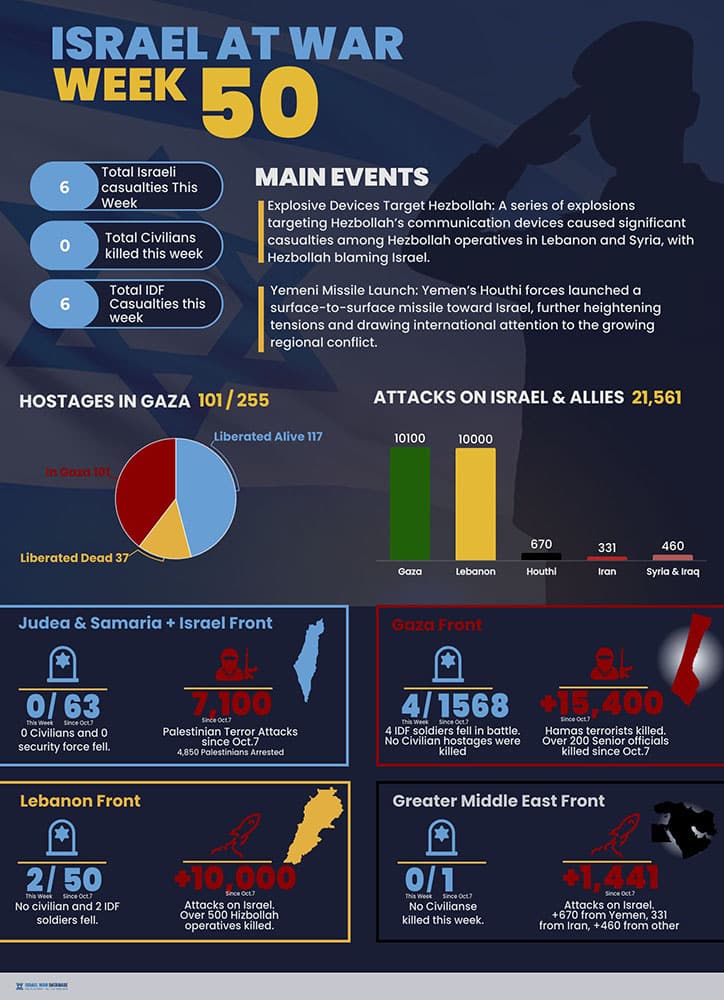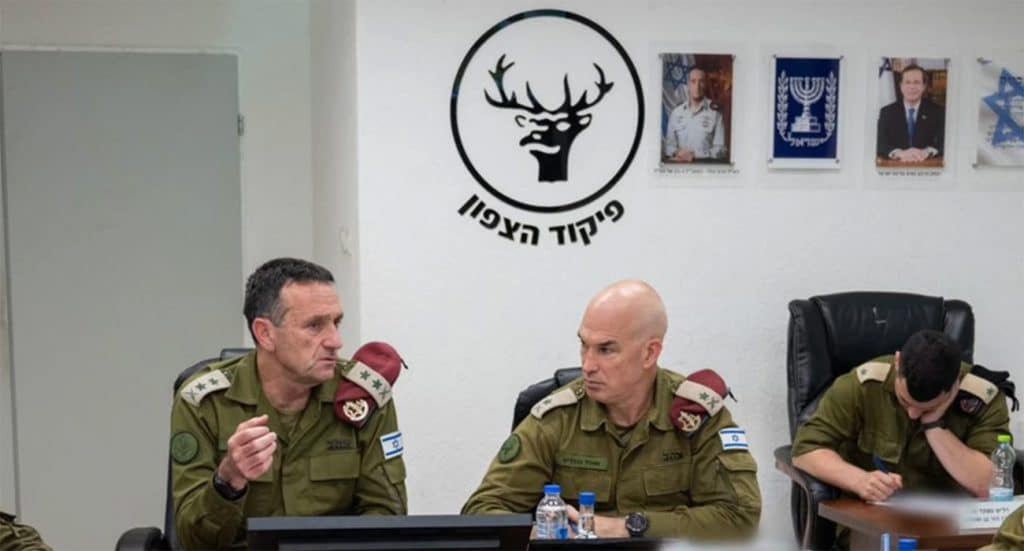
Overview
- Hezbollah Isolation: Hezbollah expressed disappointment that only Iran and Syria condemned the Israeli strike on Dahieh, while the majority of Arab countries remained silent, increasing Hezbollah’s isolation.
- Focus on Military Targets: Israel’s operations have targeted Hezbollah’s military operatives and commanders, avoiding senior political officials to avoid creating a leadership vacuum during potential ceasefire negotiations.
- Syrian Celebration: Syrians in opposition to the Asad regime celebrated the death of Hussein Ghandour, a senior Hezbollah figure responsible for atrocities in Madaya during the Syrian Civil War, viewing it as delayed justice.
- Hamas Threats: Hamas continued to issue threats of suicide bombings under the slogan “Flood of Martyrs,” escalating their rhetoric amid ongoing hostilities with Israel.
- Assassination Plot Foiled: Israeli authorities uncovered an Iranian plot to assassinate Israeli leaders, including the Prime Minister, involving an Israeli businessman recruited by Iranian intelligence.
- Hezbollah Casualties: Israeli airstrikes successfully eliminated over 12 senior Hezbollah commanders, including Ibrahim Aqil, the head of Hezbollah’s operations division, responsible for planning operations against Israel. More details in the briefing.
- Explosive Devices Target Hezbollah: A series of explosions targeting Hezbollah’s communication devices caused significant casualties among Hezbollah operatives in Lebanon and Syria, with Hezbollah blaming Israel.
- International Reactions: Iran condemned the Israeli strikes in Lebanon, while the U.S. and other countries called for restraint to prevent further escalation in the region.
- Hostage Negotiations Stalled: Efforts to negotiate a hostage deal and ceasefire with Hamas have stalled due to their escalating demands, complicating U.S. diplomatic efforts in the region.
- Yemeni Missile Launch: Yemen’s Houthi forces launched a surface-to-surface missile toward Israel prior to the Beeper attack in Lebanon, further heightening tensions and drawing international attention to the growing regional conflict.
Lebanon – Hezbollah
Explosion of Pagers in Lebanon and Syria – Targeting Hezbollah Members
On September 17, a series of explosions involving communication devices rocked Lebanon and Syria, killing at least 9 people and injuring 2,750, including 200 critically, according to the Lebanese Minister of Health. The devices, which were of the latest models purchased by Hezbollah, exploded in various locations across Lebanon, with senior Hezbollah figures among the casualties. A similar incident occurred in Damascus, Syria, where a communication device belonging to a Hezbollah operative detonated in a car. Hezbollah blamed Israel for the attacks, while a senior official confirmed that Secretary-General Hassan Nasrallah was unharmed. Reports from Syrian and Iranian media indicated that several Hezbollah operatives were injured in the explosions, which occurred across most provinces in Syria.
Lebanese officials condemned Israel for the attack, accusing it of violating Lebanon’s sovereignty. Communication advisor Amer Tabash explained that the devices, dating back to the 1990s, were used by Hezbollah to transmit encrypted messages. It is suspected that the batteries exploded due to overloading. Hezbollah sources admitted that Israel hacked into the communication devices and triggered the explosions. The New York Times later reported that Israel had planted small explosives inside the devices, which were manufactured by a Taiwanese company, and remotely detonated them. Reportedly, Hungarian company BAC Consulting based in Budapest was linked to the manufacturing of the pagers, though no official confirmation was published. Lebanese media reported that 25 people were killed and over 600 injured in the explosions, which also injured Iran’s ambassador to Lebanon.
Reactions
Hezbollah leaders have condemned Israel for its recent actions against Lebanon. Hassan Nasrallah’s political aide, Hussein Al-Khalil, warned that Israel should expect retaliation, while Hezbollah MP Ibrahim Mousawi vowed that Israel would be punished, maintaining previous deterrence measures. Iranian Foreign Minister Abbas Araghchi also condemned the Israeli aggression, expressing solidarity with Lebanon. Jordan’s Foreign Minister Ayman Safadi offered assistance to Lebanon, following King Abdullah II’s directive, and urged for an immediate halt to Israeli escalation in Gaza and the West Bank.
The Lebanese government denounced an Israeli cyber-attack that caused explosions in communication devices, labeling it a dangerous escalation. The Lebanese Foreign Ministry is preparing a complaint to the UN Security Council. The U.S. denied any involvement in the incident, stating it was unaware beforehand. Iran’s Ambassador to the UN, Amir Saeid Iravani, echoed calls for holding Israel accountable. Meanwhile, Lebanon’s Civil Aviation Directorate instructed airlines at Beirut Airport to prohibit pagers or communication devices on flights.
The Worst Blow in Hezbollah’s History
Hezbollah officially announced the deaths of 32 members within 48 hours, although the real number could be much higher. Meanwhile, Lebanon’s healthcare system was is on the verge of collapse, overwhelmed by thousands of severe injuries, particularly to the eyes, hands, and faces. A shortage of surgeons and the need for multiple complex surgeries, including for breathing difficulties, have added to the strain. The injuries have rendered nearly 4,000 Hezbollah operatives permanently unfit for service, and the organization’s communication network has been severely damaged, leading to chaos. Since the start of the war, Hezbollah claims to have has lost a total of 472 members.
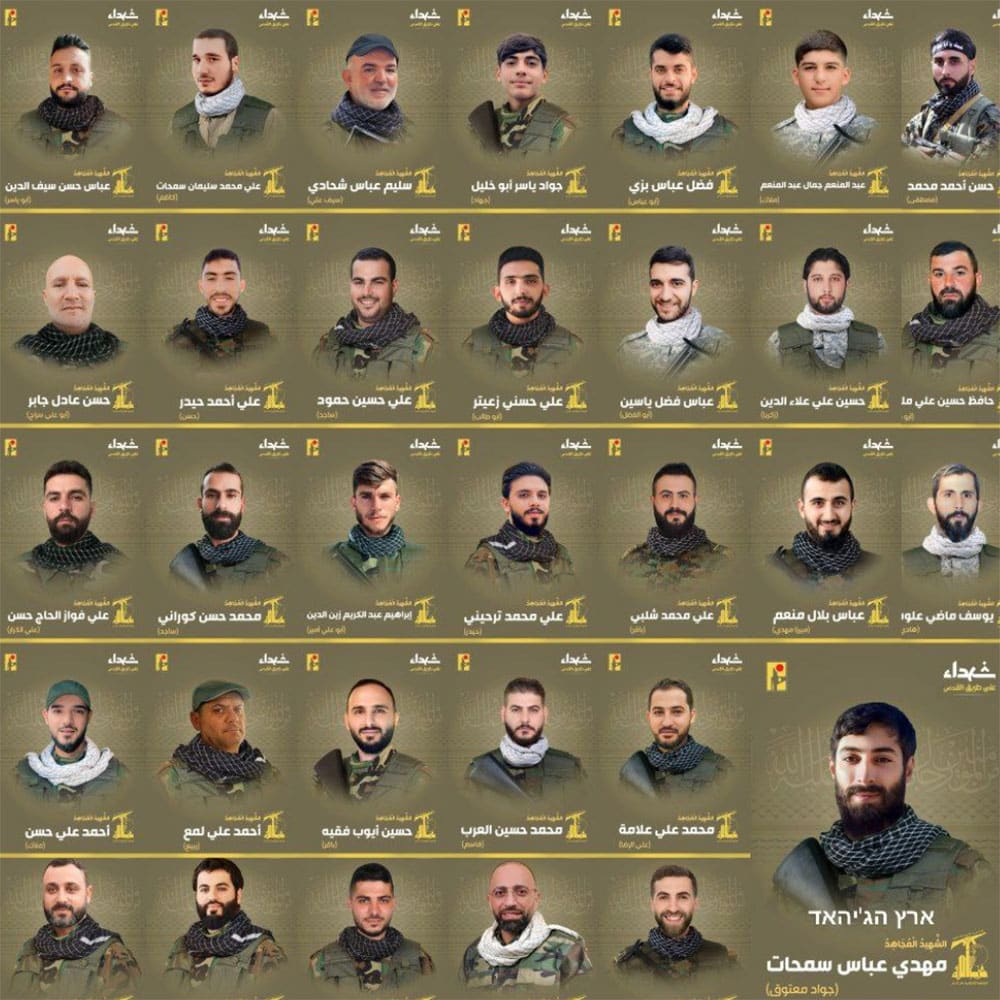
September 19 – the Islamic Center of America in Dearborn, Michigan, launched a fundraising campaign for Lebanon’s collapsing healthcare system. Sources in the U.S. reported that this campaign is a cover for raising funds for Hezbollah within the U.S.
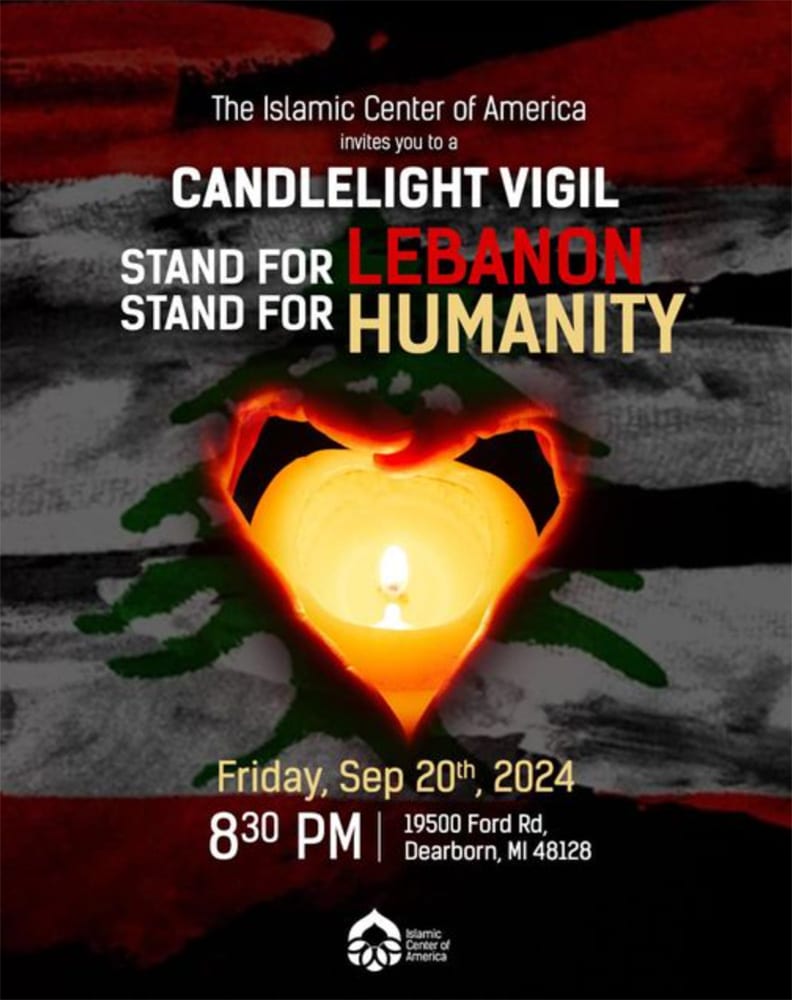

The Islamic Center began promoting the campaign on Instagram and Meta (Facebook).
Foiled Hezbollah Attack on Former Security Official
September 17 – Aa Hezbollah plot targeting a former senior security official was thwarted.
The Shin Bet revealed that it had thwarted Hezbollah’s plot using a standard Kalimgor bomb, widely used by Hezbollah, which was to be activated remotely from Lebanon with a camera and cellular-based system.
IDF Spokesperson
September 19 – the IDF attacked military structures and a weapons depot belonging to Hezbollah in seven locations in southern Lebanon.
During the night, Israeli Air Force fighter jets attacked Hezbollah military buildings in the regions of Shaqhin, Al-Tayba, Blida, Mis Al-Jabal, Ayteroun, and Kafr Kila in southern Lebanon.
Additionally, aircraft targeted a Hezbollah weapons depot in the Al-Khiam area in southern Lebanon. Artillery fire also targeted several areas in southern Lebanon.
Nasrallah’s Speech
Hezbollah Secretary-General Hassan Nasrallah responded to recent pager and communication device explosions in Lebanon, which killed dozens of Hezbollah members and injured thousands. In his speech, Nasrallah vowed severe and just retaliation against Israel but kept the details of Hezbollah’s response within a small leadership circle. He accused Israel of intending to kill 5,000 Hezbollah members and labeled the attack as crossing all red lines, potentially amounting to a declaration of war, though he stopped short of officially declaring one. Nasrallah warned that Israel’s attempts to escalate militarily would not succeed in displacing northern residents and emphasized that ending the war in Gaza is a condition for a ceasefire in Lebanon.
Nasrallah also addressed Hezbollah’s internal investigation into how Israel managed to booby-trap thousands of communication devices, acknowledging the organization had suffered a severe blow but stressing that its command structure remained intact. He rejected any threats to halt Hezbollah’s support for Gaza, asserting that Hezbollah’s front will remain active until the aggression in Gaza ends. Nasrallah taunted Israel, expressing hope that it would launch a military maneuver in southern Lebanon, which he believes would offer Hezbollah a “historic opportunity.” He referenced Hezbollah’s past guerrilla actions against Israeli forces in southern Lebanon, warning that any attempt to establish a security zone would turn into a trap for Israeli forces.
Elimination of Ibrahim Aqil
On September 20, the Israel Defense Forces (IDF) conducted a targeted airstrike in Beirut, killing Ibrahim Aqil, the head of Hezbollah’s operations division and leader of the elite Radwan Unit. Aqil was responsible for planning Hezbollah’s “Plan to Conquer the Galilee” and had a long history of orchestrating attacks, including the 1983 U.S. Embassy bombing in Beirut. The strike also eliminated other senior Hezbollah commanders, marking a major victory for Israeli intelligence and a significant blow to Hezbollah’s operational capabilities.
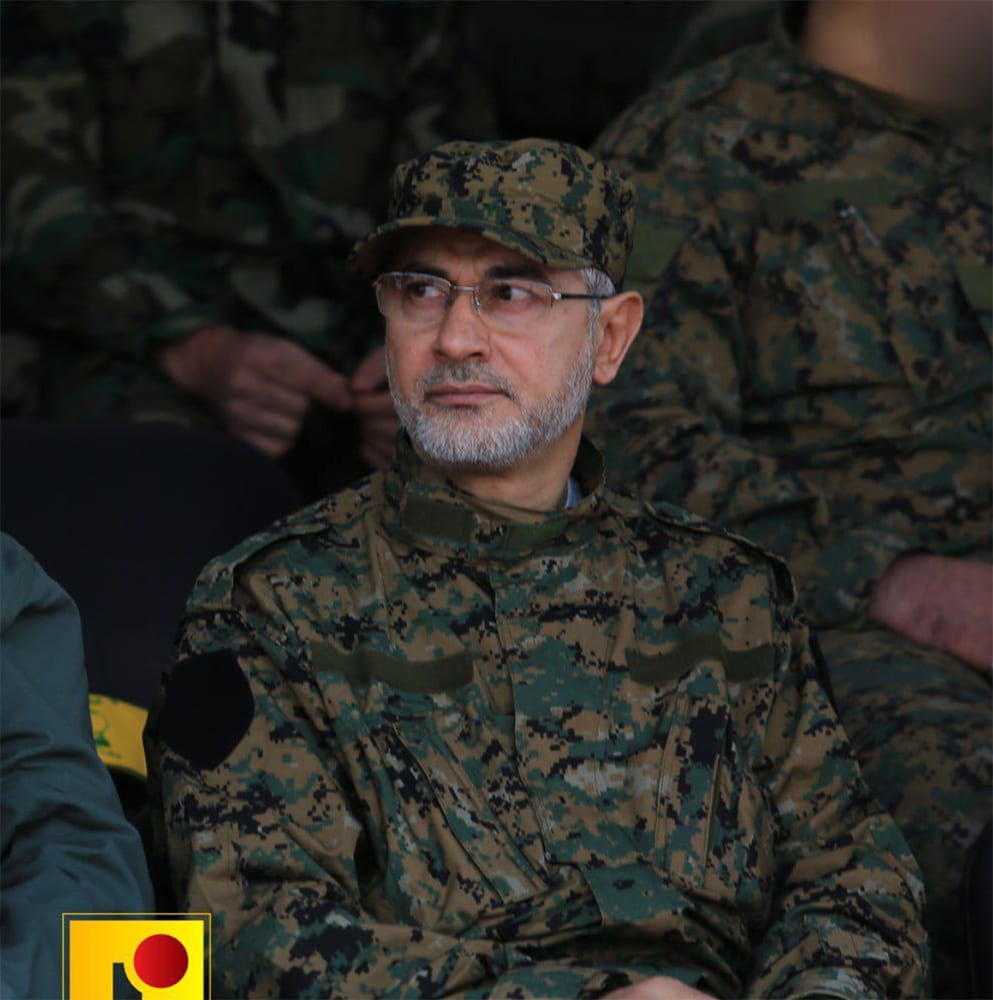
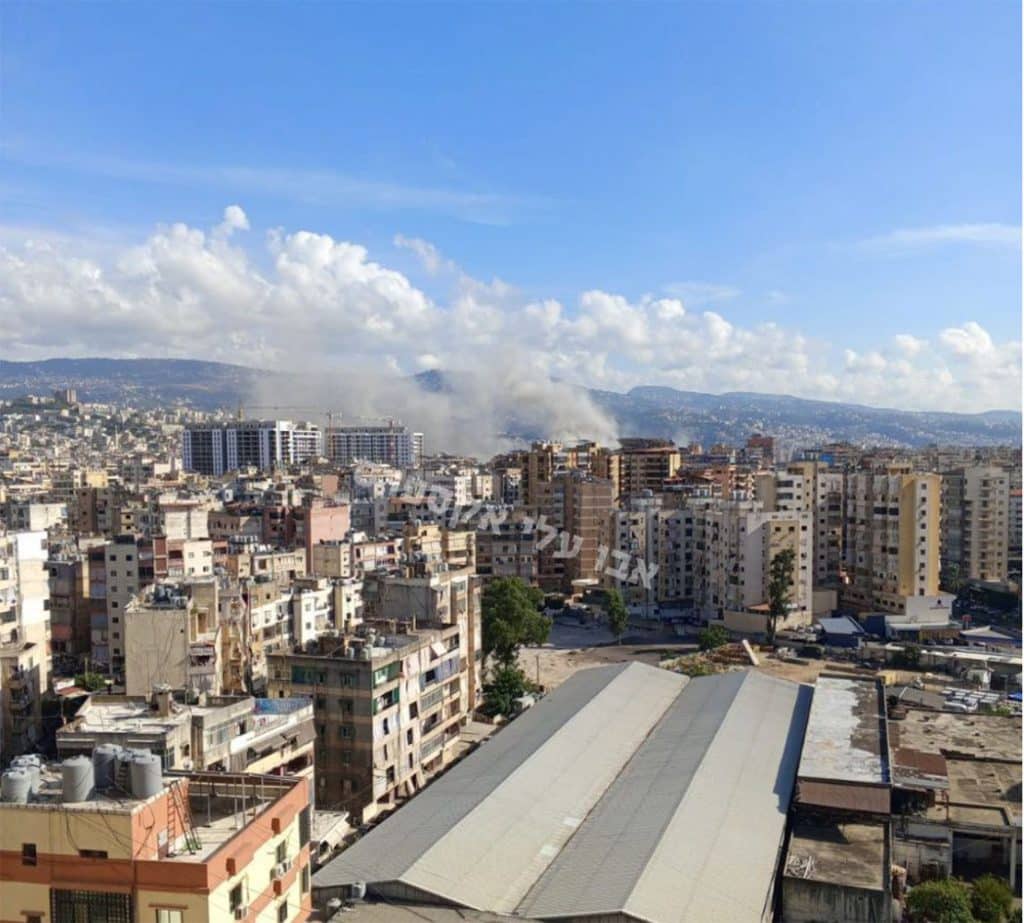
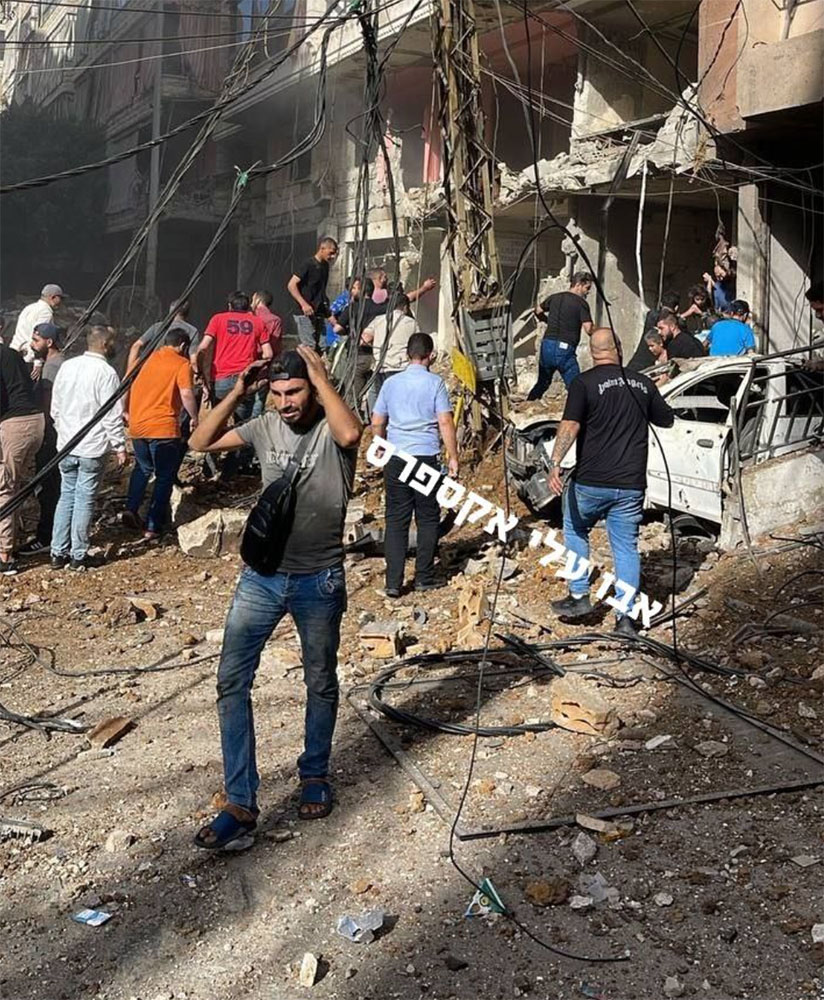
The airstrike, which targeted key military figures, left Hezbollah in a leadership crisis, with multiple high-ranking operatives killed, including Ahmad Wahbi, acting leader of the Radwan Force. The deaths have weakened Hezbollah’s command structure, and regional isolation for the group is deepening, with only Iran and Syria condemning the strike. On September 21, Syrians celebrated the death of another senior Hezbollah figure, Hussein Ghandour, known for his brutal role in the Syrian Civil War, seeing it as delayed justice and a potential turning point in Hezbollah’s influence.
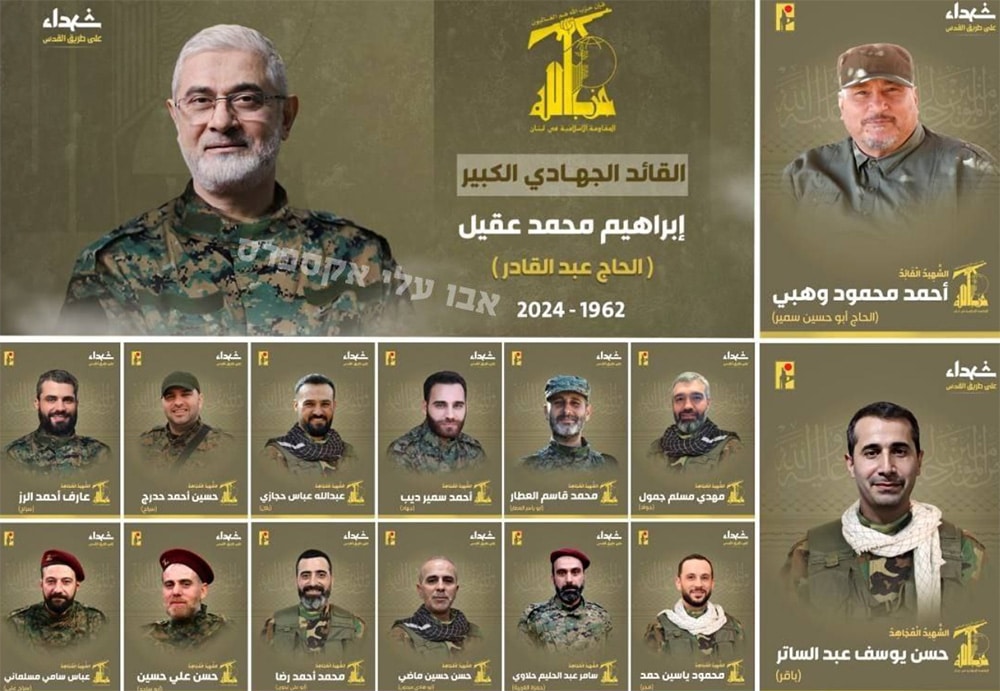
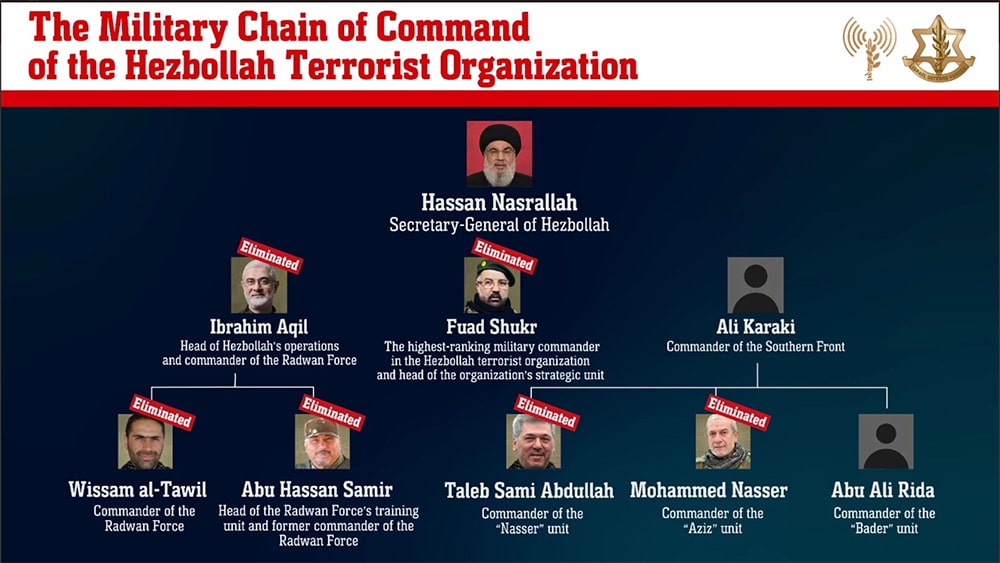
Israel – Domestic, Military/Political
Stabbing Attack Near Damascus Gate, Jerusalem
September 15 – A 20-year-old police officer sustained minor injuries in a stabbing attack near the Damascus Gate in Jerusalem during a routine security inspection.
An Israeli businessman was recruited by Iranian intelligence to facilitate assassination plots targeting senior Israeli officials, including Prime Minister Benjamin Netanyahu, Defense Minister Yoav Gallant, and Shin Bet Chief Ronen Bar. The businessman, who had ties to Turkey and Iran, was smuggled into Iran twice in 2024. While in Iran, he was assigned tasks like transferring weapons and money, photographing crowded areas, and planning high-profile assassinations. Despite expressing interest, he demanded a one-million-dollar advance before proceeding, which the Iranians declined. The businessman was later arrested by Israeli authorities.
On September 20, Israel formally contested the jurisdiction of the International Criminal Court (ICC) in The Hague and challenged the legal basis for the request to issue arrest warrants for Prime Minister Benjamin Netanyahu and Defense Minister Yoav Gallant.
Gaza Strip
September 15 – A Hamas command and control facility was targeted at a location previously used as the Ghazi Al Shawwa School in Beit Hanoun, located in northern Gaza. The facility served as a hideout and staging ground for rocket fire directed at IDF forces and Israel in recent weeks.
September 17 – Ahmed Ayesh Salameh Al-Khashash, the head of the rocket unit for Palestinian Islamic Jihad, was killed while present in a humanitarian zone in Khan Yunis. From this area, he had been orchestrating rocket fire towards Israeli territory.
September 21 – Palestinian channels report that hidden listening devices were discovered inside an object resembling a stone among the tents of displaced persons in the southern Gaza Strip. According to Hamas sources, the devices were dropped among the tents using drones.
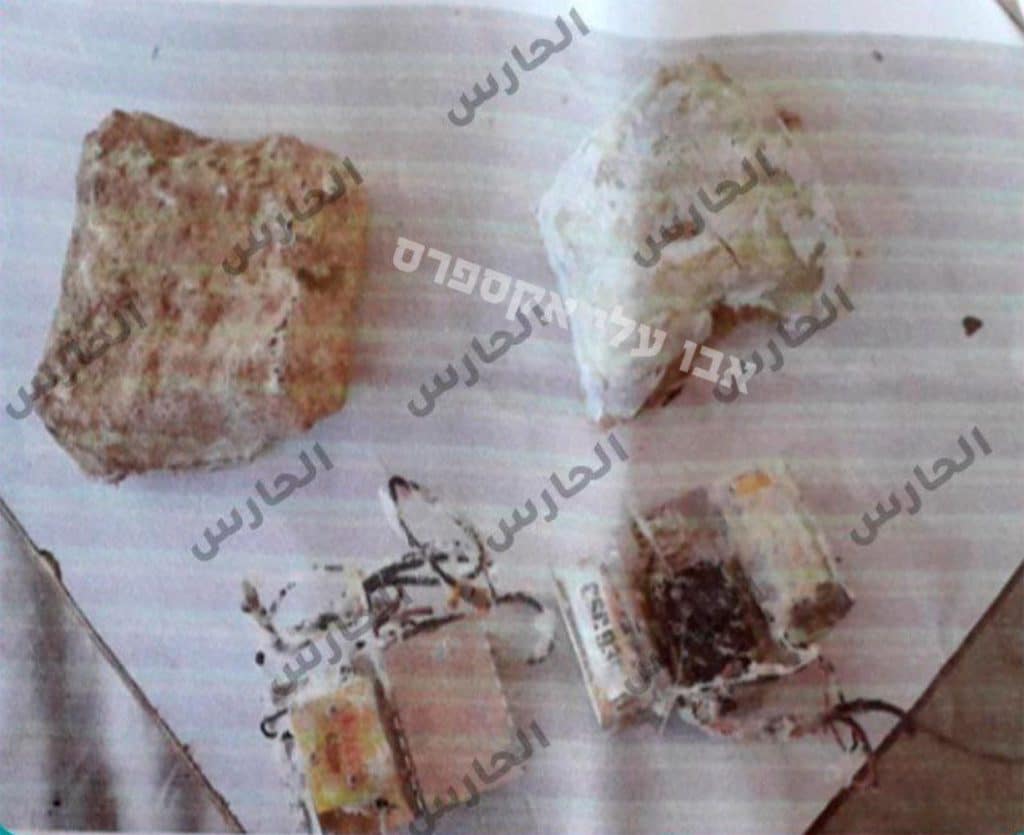
Hamas Developments
On September 15, senior Hamas official Osama Hamdan announced that Hamas supports a post-conflict Palestinian national unity government that includes Hamas, following agreements made in the July 2024 reconciliation meeting in Beijing. He emphasized the importance of a Palestinian-led governance structure after the conflict and mentioned an upcoming meeting of Palestinian organizations in Cairo to discuss the future governance of Gaza.
By September 16, reports indicated that Yahya Sinwar, the Hamas leader, continues to direct operations from hiding within Gaza using a secure, handwritten courier system. Sinwar is expected to deliver a message to the international community, reaffirming his commitment to the Palestinian cause. Hamdan reiterated that Sinwar’s focus remains on the liberation of Palestine and confirmed the consensus for a Palestinian unity government.
On September 17, Khaled Meshaal, another senior Hamas leader, rejected calls for a ceasefire that compromises the group’s principles, emphasizing the necessity of continued struggle. He defended the October 7 attack and stated that Gaza’s suffering is part of the price for eventual liberation. The following day, Hamas’ military wing released a video threatening further suicide attacks, featuring past incidents and highlighting the group’s commitment to violent resistance.
Hostages and Ceasefire Negotiations
September 18 – According to the Qatari newspaper Al-Araby Al-Jadeed, Egypt and Hamas have reached an understanding to reject any scenario in which Israeli forces remain on the Philadelphi Corridor. This comes in the wake of U.S. Secretary of State Antony Blinken’s visit to Cairo. The report noted that the U.S. administration’s proposed framework does not include “real solutions” to the obstacles that have hampered previous negotiations and lacks a clear commitment to the withdrawal of Israeli forces from the Philadelphi Corridor.
September 20 – Senior officials from the White House, State Department, and Pentagon expressed growing pessimism about the prospects of securing a hostage deal and ceasefire in the Gaza Strip. In comments to The Wall Street Journal, they acknowledged that such an agreement is unlikely to be reached during President Joe Biden’s administration. “There is no deal on the horizon, and I’m not confident there ever will be,” one official remarked. According to reports, the officials attributed their pessimism to two primary factors: the substantial number of Palestinian prisoners Hamas is demanding in exchange for the hostages, and Hezbollah’s recent electronic device detonations, which have heightened the risk of regional conflict and complicated negotiations with Hamas. Additionally, U.S. officials pointed to Hamas’s intransigence, noting that the group repeatedly raises demands and then refuses to finalize a deal even after Israel and the United States agree to the terms.
Judea and Samaria
September 18 – Pro-Hamas channels issued a threatening message in anticipation of the upcoming Jewish holidays, stating: “Prepare your weapons for sacrifice on behalf of our prisoners. Their so-called holidays are about to begin.”
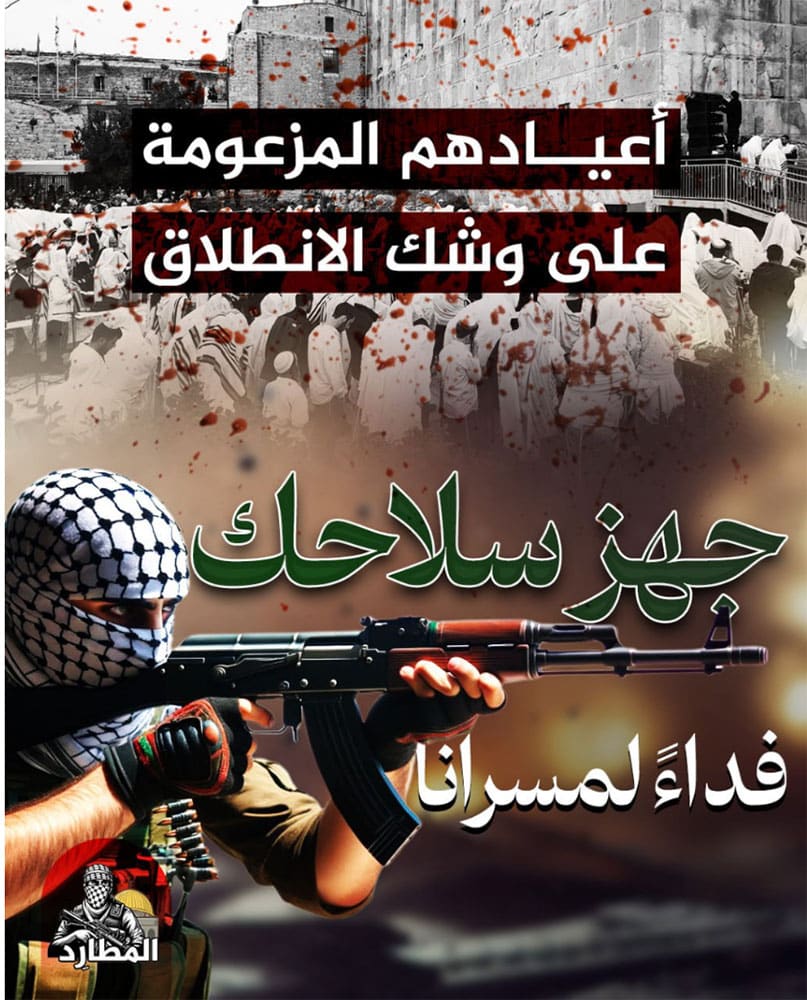


September 19 – Pro-Hamas channels continued to escalate their rhetoric, introducing a new slogan, “The Flood of Martyrs,” reminiscent of “The Al-Aqsa Flood,” signaling a potential wave of suicide bombers.
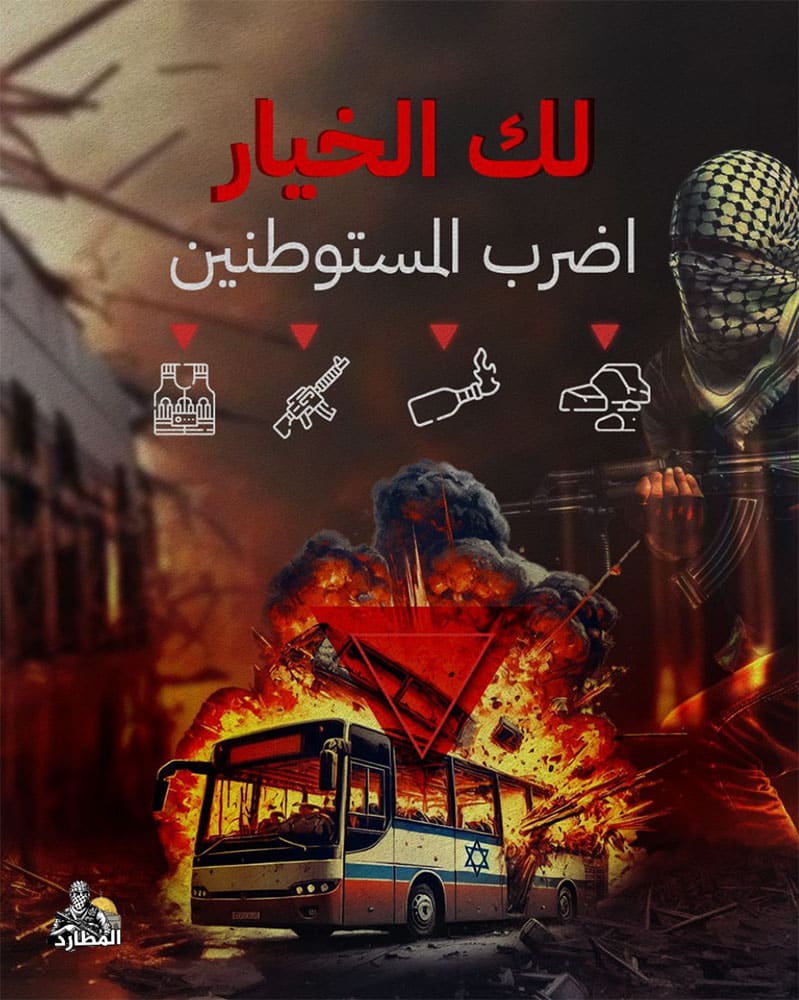
September 19 – These channels further incited violence by providing specific methods for carrying out attacks, including:
- Stones
- Molotov cocktails
- Firearms
- Explosive belts
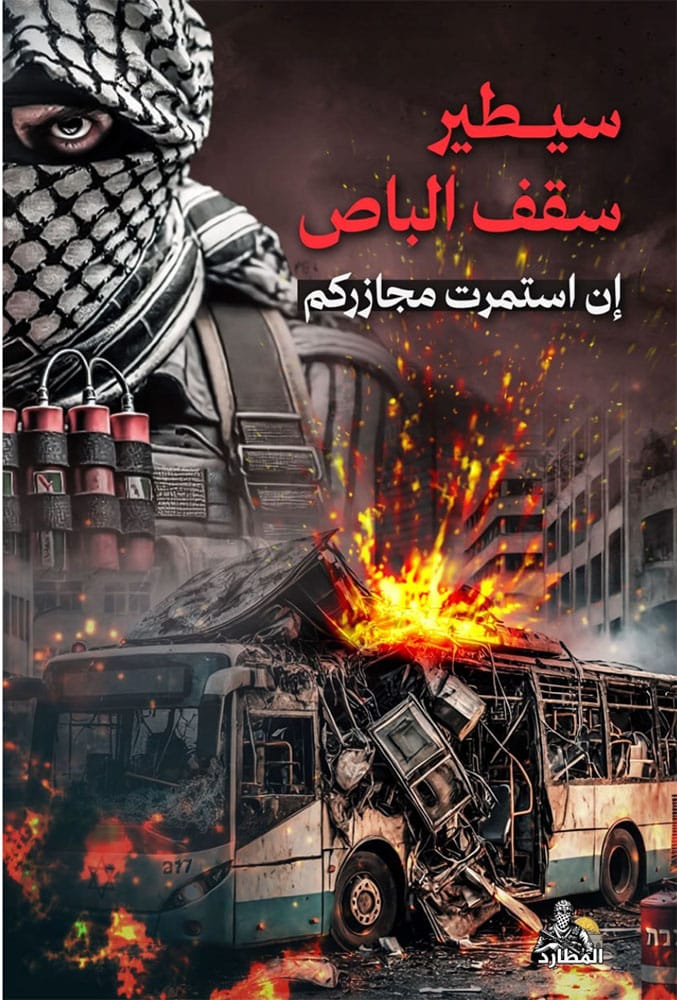
The message concluded with: “You have a choice… strike the settlers.”
September 19 – Pro-Hamas channels also issued threats under a “new equation,” warning: “The roof of the bus will fly if your massacres continue.”
These messages were accompanied by a hashtag referencing the infamous terrorist Yahya Ayyash: “Ayyash is back.”
September 20 – IDF Duvdevan Unit operatives neutralized four armed militants in Kabatiya, including Shadi Zakarneh, the leader of a terrorist network operating in the area. According to an official IDF statement, Zakarneh was responsible for orchestrating and directing attacks in northern Samaria. Additionally, seven terror suspects were apprehended during the operation. In a separate incident, three more militants were killed in an Israeli Air Force strike targeting a vehicle. The strike triggered a secondary explosion due to the presence of weapons and explosives inside the vehicle.
Iran
Iranian Foreign Minister Abbas Araghchi stated that Iran’s policy remains one of unwavering support for the “resistance.” He emphasized that the “Zionist regime” has not yet succeeded in its primary objective—the destruction of Hamas. Araghchi further noted that Iran has skillfully avoided traps that could have escalated into direct conflict.
September 16 – Supreme Leader of Iran, Ayatollah Ali Khamenei, during a meeting with Sunni clerics in honor of “Muslim Unity Week,” reaffirmed that supporting “the oppressed in Gaza and Palestine” is a clear and fundamental duty for Iran.
September 17 – A diplomatic source revealed that Esmail Qaani, the commander of Iran’s Quds Force, arrived in Baghdad on September 17, 2024, where he held meetings with the leaders of pro-Iranian Shia militias. These meetings included key figures such as Hadi al-Amiri, Secretary-General of the Badr Organization; Qais al-Khazali, Secretary-General of Asa’ib Ahl al-Haq; and Hussein al-Hamidawi, commander of Kata’ib Hezbollah.
September 18 – Iranian Foreign Ministry spokesman Nasser Kanaani condemned what he described as “Israeli aggression against communication infrastructure in Lebanon” following an operation to destroy pager systems. Kanaani labeled this as evidence of genocide and warned that Israel’s actions continue to jeopardize regional peace and security, calling for immediate international intervention to counter Israel’s plans.
September 20 – Iran held a military demonstration attended by the newly inaugurated president and the commander of the Islamic Revolutionary Guard Corps’ Aerospace Force. The event showcased the “136 B” suicide drone and a ballistic missile, both belonging to the Islamic Revolutionary Guard Corps.
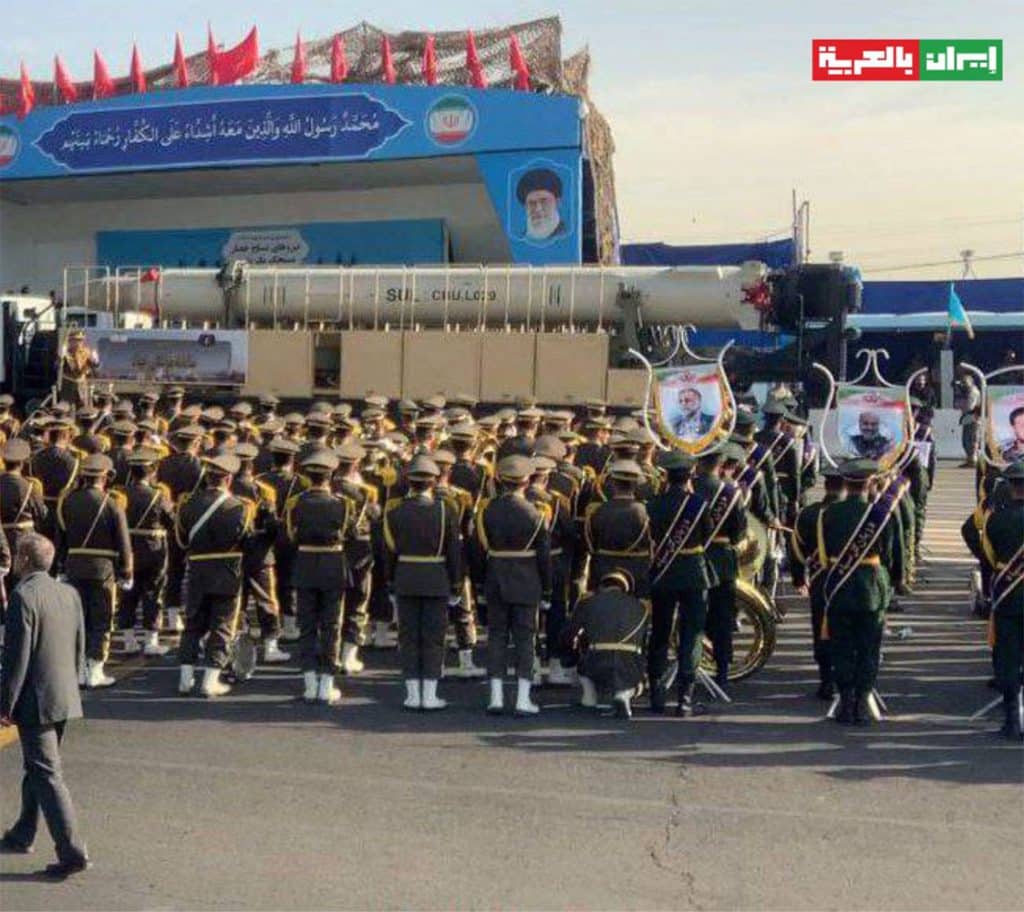
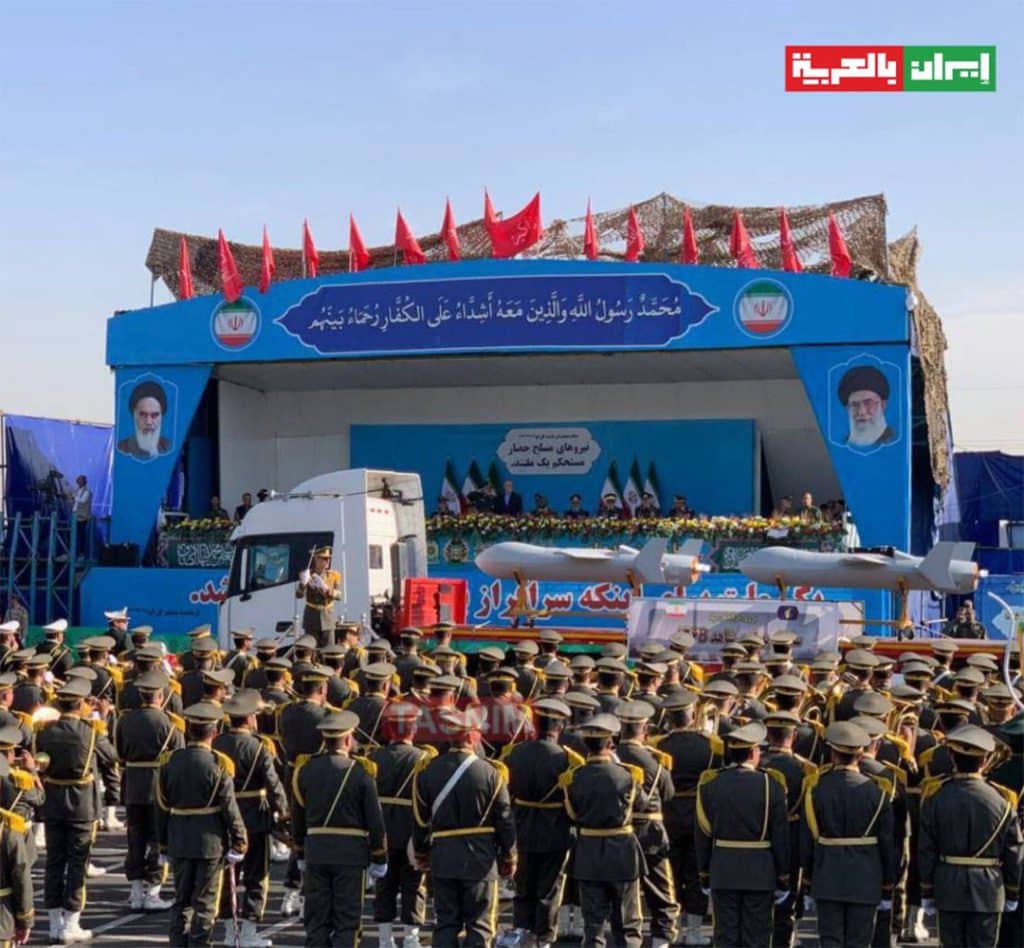
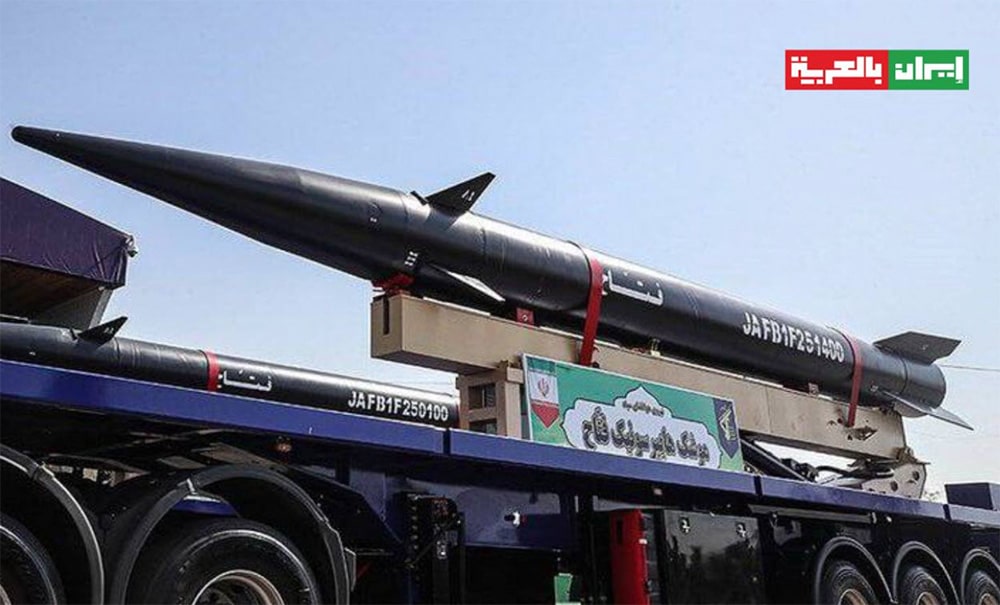
International
Recent reports suggest that the German government has been delaying Israeli requests for arms sales while approving sales to Qatar, a known supporter and sponser of Hamas. Despite no official embargo, Israel’s requests for tank shells and other munitions have faced long delays, likely due to internal disagreements within Germany. The Chancellor’s office supports the sales, but the Foreign Ministry opposes them.
On September 18, the UN General Assembly adopted a resolution demanding that Israel end its presence in the Occupied Palestinian Territory within 12 months, citing international legal obligations. The resolution, which received 124 votes in favor, calls for Israel’s withdrawal from the territory and a halt to settlement activities. Israel, the U.S., and a few EU nations, including Hungary and Czechia, voted against the resolution, while many EU members abstained.
International condemnation followed an attack attributed to Israel targeting Hezbollah’s communication systems in Lebanon, while mostly ignoring the Hezbollah responsibility for the ongoing tensions, with EU’s Josep Borrell, Spain, and the UK calling for restraint. UK Foreign Secretary David Lammy urged an immediate ceasefire between Israel and Hezbollah, emphasizing the need for a political solution to allow citizens in both countries to return to their homes safely.
United States
U.S. State Department spokesperson Matthew Miller stated, “We urge Iran not to exploit the recent explosions in Lebanon or contribute further to regional instability.” His comments followed reports that Iran’s ambassador to Lebanon sustained minor injuries after one of his security guards was carrying a communication device that detonated.
September 18 – U.S. Vice President and Democratic presidential candidate Kamala Harris, in an interview at the National Association of Black Journalists (NABJ) conference, expressed her strong support for delaying the shipment of heavy munitions to Israel. She remarked, “The key to stability in this region lies in securing a comprehensive agreement, and we must work to finalize it. However, let me be clear—I fully support Israel’s right to self-defense, and I also support the Palestinian right to live with dignity, self-determination, and security.”
U.S. Senator Bernie Sanders announced that he intends to introduce legislation aimed at halting the sale of U.S. offensive weapons to Israel, citing concerns over the impact on civilians resulting from Israel’s military actions against Hamas. “Supplying additional offensive weaponry to perpetuate this catastrophic conflict would be in violation of both U.S. and international law,” Sanders stated.
September 20 – The left-wing so-called “pro-Israel” lobby group in the United States, J Street, has launched a petition urging the U.S. administration to impose sanctions on Ministers Itamar Ben Gvir and Bezalel Smotrich. The petition alleges that both ministers are “using their positions to incite violence.” According to J Street, thousands of American Jews have already signed the petition, calling on members of Congress to support the initiative. The petition further accuses Ben Gvir and Smotrich of “inciting the dehumanization of Palestinians, promoting settlement expansion, displacing families from their land, and protecting violent settlers.”
Turkey
September 19 – A Turkey Defense Ministry official stated that Turkey is reassessing its security protocols for communication devices used by its armed forces following the deadly explosions in Lebanon. The official, who spoke on condition of anonymity, emphasized that Turkey’s military relies exclusively on domestically produced equipment. However, Ankara has implemented additional control mechanisms to ensure security when third parties are involved in the procurement or production of these devices.
Egypt
September 18 – Egyptian President Abdel Fattah el-Sisi met with U.S. Secretary of State Antony Blinken in Cairo. During the discussions, President el-Sisi addressed the recent explosions in Lebanon and emphasized Egypt’s commitment to supporting Lebanon’s security, stability, and sovereignty. He further stated that Egypt opposes any efforts to escalate the regional conflict and called for mediating nations to expedite negotiations aimed at securing a hostage agreement.
Jordan
September 18 – Jordan’s King Abdullah appointed Jafar Hassan, a key palace aide, as the new prime minister following the government’s resignation on Sunday, according to a statement from the royal court. This move comes shortly after parliamentary elections in which the Islamist Action Front, affiliated with the Muslim Brotherhood, increased its representation in the 138 member Jordanian Parliament from 10-31 seats, and are now the single largest opposition party in Jordan. Hassan, currently the head of King Abdullah’s office and a former planning minister, will succeed Bisher Khasawneh, a seasoned diplomat and former palace adviser, who served as prime minister for nearly four years.
Yemen – Houthis, an Iranian proxy
On September 15, a missile launched from Yemen towards Israel was successfully intercepted by Israel’s air defense system, though debris caused damage near Lod. The missile was tracked throughout its flight, and the IDF confirmed it was not hypersonic. However, Houthi spokesperson Yahya Saree claimed that the missile was a hypersonic ballistic missile aimed at a military target in Jaffa, asserting that it struck its target despite Israeli interception efforts, and caused mass panic in Israel.
Houthi officials emphasized that this attack marked the “fifth phase” of their operations in support of Gaza, vowing more severe actions to follow. They stated that their missile capabilities challenge Israel’s deterrence and indicated coordination with Palestinian factions. Despite Israeli airstrikes in Yemen, Houthi forces clarified that their missile strike was not a direct response to these attacks but part of their broader strategic objectives. Meanwhile, Iran distanced itself from directly supplying hypersonic missiles, attributing Houthi advancements to local production.
On September 16, Houthi forces claimed to have shot down an American drone over Yemen and released footage of the “Palestine 2” missile launch, showcasing its advanced capabilities. In related developments, Houthi representatives alleged that the U.S. and U.K. offered recognition of the Houthi government in exchange for halting attacks on Israel, though these claims were denied by U.S. officials. Additionally, Yemen announced its readiness to send fighters to support Hezbollah if needed.
Iraq & Syria – Iranian proxies
On September 15, the U.S. military base in Kharab al-Jir, northeastern Syria, was attacked using UAVs, which U.S. forces intercepted, with some reports suggesting rockets were involved. No casualties were reported.
Meanwhile, on September 16, sources confirmed that Hamas and the Houthi movement had opened permanent offices in Baghdad in June 2024, reportedly with tacit Iraqi government approval. These offices are being used to strengthen ties within Iraq, though Iraqi officials denied these claims, suggesting they are attempts to pressure the government.
The U.S. State Department expressed concern that Hamas and Houthi presence in Iraq could lead to further violence by other armed groups, destabilizing Iraq and deepening regional conflicts. On September 18, Iraqi Shiite militias claimed responsibility for a UAV attack targeting Haifa, and Israeli fighter jets intercepted another UAV launched from Iraq over the Sea of Galilee, with no casualties reported.

